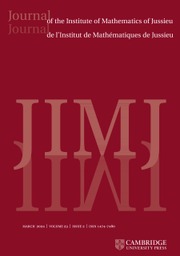Article contents
STABILITY OF $\gamma$-FACTORS FOR QUASI-SPLIT GROUPS
Published online by Cambridge University Press: 14 February 2007
Abstract
One of the main obstacles in applying converse theorems to prove new cases of functoriality is that of stability of $\gamma$-factors for a certain class of $L$-functions obtained from the ‘Langlands–Shahidi’ method, where the $\gamma$-factors are defined inductively by means of ‘local coefficients’. The problem then becomes that of stability of local coefficients upon twisting the representation by a highly ramified character. In this paper we first establish that the inverses of certain local coefficients are, up to an abelian $\gamma$-factor, genuine Mellin transforms of partial Bessel functions of the type we analysed in our previous paper. The second main result is then the resulting stability of the local coefficients in this situation, which include all the cases of interest for functoriality. Hopefully, the analysis given here will open the door to a proof of the general stability and the equality of $\gamma$-factors obtained from different methods through integration over certain quotient spaces whose generic fibres are closed. They do not seem to have been studied before in any generality.
Keywords
Information
- Type
- Research Article
- Information
- Journal of the Institute of Mathematics of Jussieu , Volume 7 , Issue 1 , January 2008 , pp. 27 - 66
- Copyright
- 2007 Cambridge University Press
- 11
- Cited by

